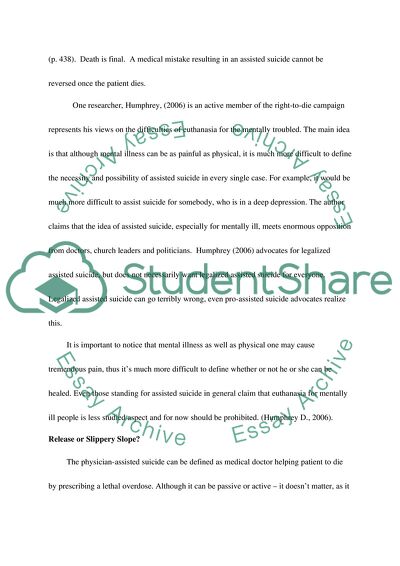
- Home
- Free Samples
- Premium Essays
- Editing Services
- Extra Tools
- Essay Writing Help
- About Us
- Studentshare
- Subjects
- Miscellaneous
- Physician -Assisted Suicide
Physician -Assisted Suicide - Essay Example

- Subject: Miscellaneous
- Type: Essay
- Level: Undergraduate
- Pages: 4 (1000 words)
- Downloads: 0
- Author: tleuschke
Extract of sample "Physician -Assisted Suicide"
One more argument against can be based on the fact that the 1990 survey in the Netherlands showed that only 18 percent of all euthanasia was reported to the government with the proper documentation, the number has since risen to 41 percent in 1995. This paper will argue that assisted suicide is never justifiable. One of persuasive examples is the one which describes a man, who suffered a kidney disease but was refused with euthanasia. The diagnosis turned out to be mistaken and he felt better in some time, spending about a year with his family (Humphrey, 2006).
Two risks that cannot be managed in the legalization of assisted suicide is the patient’s feelings and medical misdiagnosis (Bitten, 1998, p. 438). Misdiagnosis, such as the example above, is inevitable, no matter how careful medical personnel act. Bitten (1998) reports, “The first is the risk of medical mistake, including a misdiagnosis of competence of competence or terminal illness” (p. 438). Death is final. A medical mistake resulting in an assisted suicide cannot be reversed once the patient dies.
One researcher, Humphrey, (2006) is an active member of the right-to-die campaign represents his views on the difficulties of euthanasia for the mentally troubled. The main idea is that although mental illness can be as painful as physical, it is much more difficult to define the necessity and possibility of assisted suicide in every single case. For example, it would be much more difficult to assist suicide for somebody, who is in a deep depression. The author claims that the idea of assisted suicide, especially for mentally ill, meets enormous opposition from doctors, church leaders and politicians.
Humphrey (2006) advocates for legalized assisted suicide, but does not necessarily want legalized assisted suicide for everyone. Legalized assisted suicide can go terribly wrong, even pro-assisted suicide advocates realize this. It is important to notice that mental illness as well as
...Download file to see next pages Read MoreCHECK THESE SAMPLES OF Physician -Assisted Suicide
Physician-Assisted Suicide
Physician-assisted suicide
Physician-Assisted Suicide
Physician Assisted Suicide
Physician Assisted Suicide
Physician Assisted Suicide
Physician Assisted Suicide
Physician Assisted Suicide

- TERMS & CONDITIONS
- PRIVACY POLICY
- COOKIES POLICY